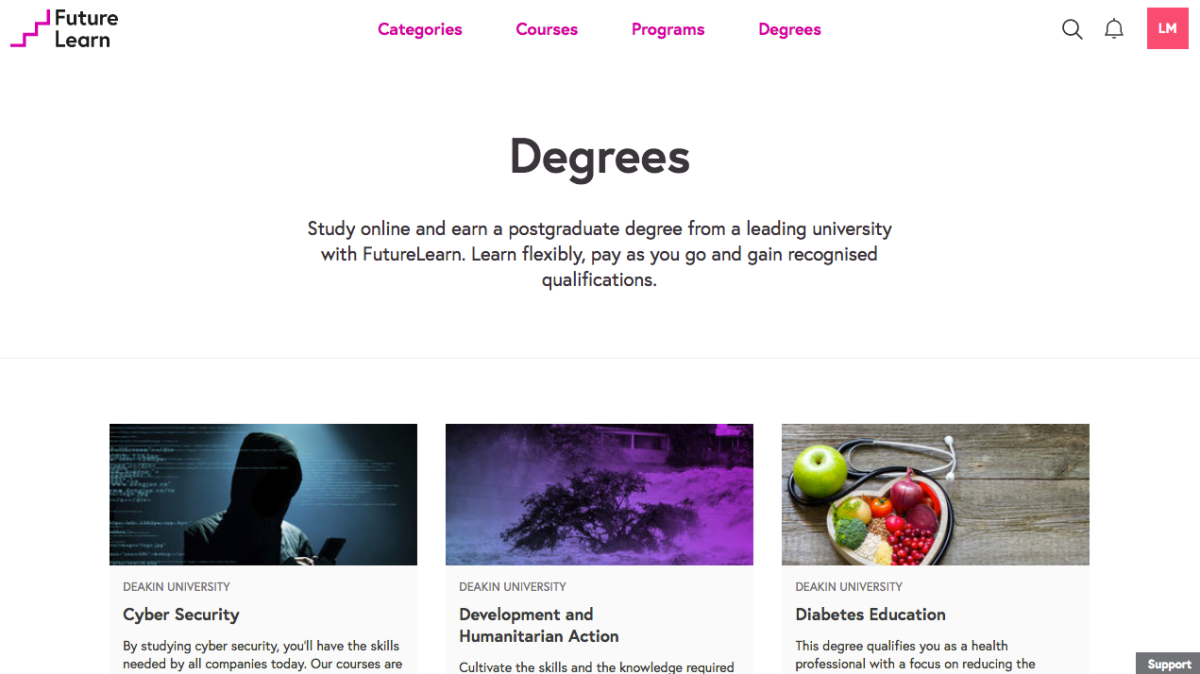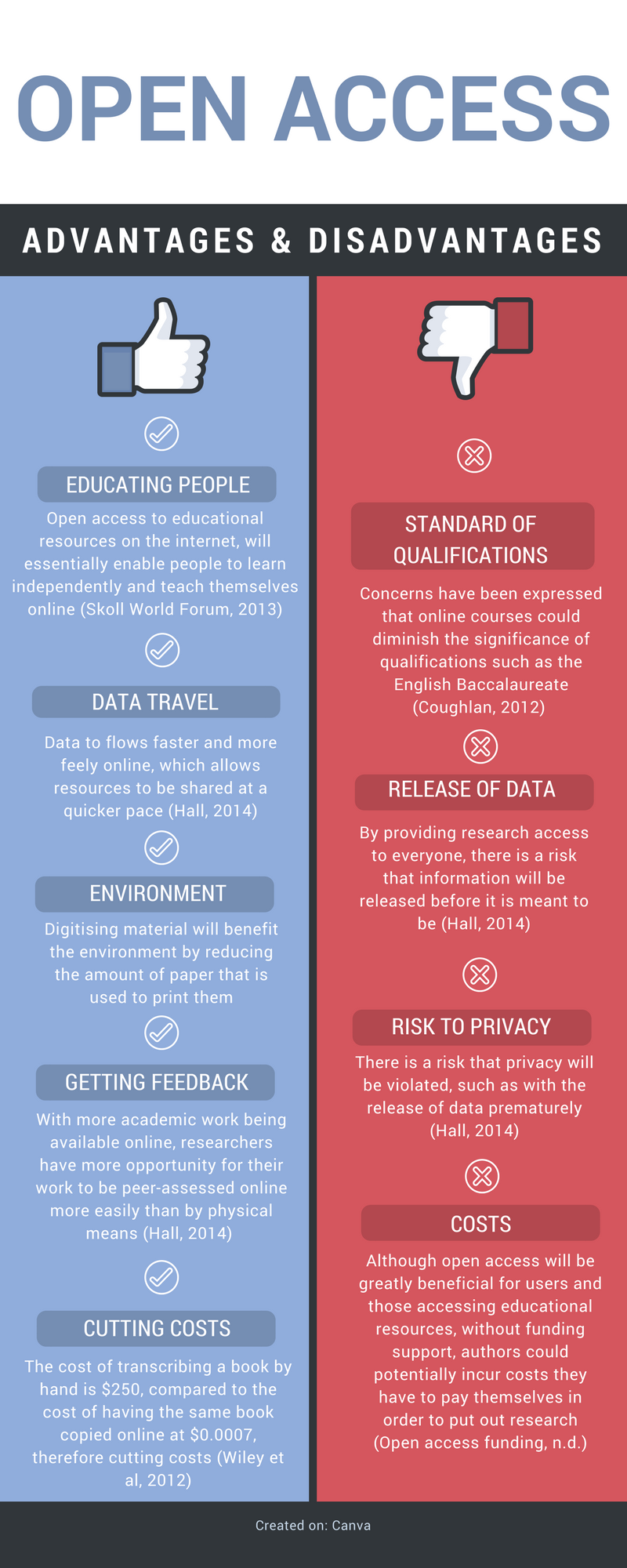WHAT IS OPEN ACCESS?
Open access is defined as the free accessibility to literature online, allowing it to be used with minimal restrictions, including material being royalty-free (Bailey, 2008). With specific reference to academic and educational material, resources with open access can be used by students in education from all ages for several purposes, such as for homework or textbook material (Wiley et al, 2012).
The historical context which shows why open access is so significant can be viewed below:
Watch from 0.20 to 2.46.
WHAT IS THE IMPACT OF OPEN ACCESS?
The impact that open access has is it can play it part in revolutionizing education and the way that students learn (Wiley et al, 2012). Global influencers such as Bill Gates have showed support for the use of the ‘MOOCs’, which are massive open online courses, aimed to teach students in a similar way that lectures do at universities (Hall, 2014). For example, websites such as FutureLearn, encourage users to take free courses online, with the option to receive a certificate of completion for a small fee, at their own leisure.

Open access is a topic that has been widely debated. Some of the advantages and disadvantages of open access are:

SHOULD OPEN ACCESS BE IMPLEMENTED EVERYWHERE?
In today’s digital age, monetization of online material is a viable prospect in order to benefit from the use of content. The ethics of charging for certain online content can often be questioned, which could rationalize why websites such as Twitter are so conscious of how they make money from the hundreds of millions of users they garner each month (Gadkari, 2013). There are looming fears that a rapidly increasing number of media companies will use paywalls to guard their online content from being used for free (Lepitak, 2016).
In light of this, I feel that educational resources should be immune from these issues. Some would argue that we pay for education, and since state schools can ask for contributions of some form, it is only fair that material online should be monetized. However, the initiatives that are being set up, such as by edX to provide online educational resources in community schools in the US (Coughlan, 2012), can educate people who may feel as though they could not learn any other way. Open access has the potential to open the door to providing the education that everyone deserves.
Word Count: 398
References
Bailey Jr, C.W., 2008. Open access and libraries. Collection Management, 32(3-4), pp.351-383.
Coughlan, S., 2012, November 19. Gates Foundation funds online university open access. BBC News. [Accessed: 6 May 2017]
http://www.bbc.co.uk/news/education-20393753
Gadkari, P., 2013, November 7. How does Twitter make money?. BBC News. [Accessed: 7 May 2017]
http://www.bbc.co.uk/news/business-24397472
Hall, M., 2014, February 18. Why open access should be a key issue for university leaders. The Guardian.
Lepitak, S., 2013, April 12. 90% of online content to be held behind paywalls in three years media company survey suggests. The Drum. [Accessed 6 May 2017]
Open access funding. (n.d.). Springer. [Accessed: 6 May 2017] Retrieved from:
http://www.springer.com/gp/open-access/open-access-funding
Skoll World Forum., 2013, April 7. Education Finally Ripe For Radical Innovation By Social Entrepreneurs. Forbes. [Accessed 6 May 2017]
Wiley, D., Green, C. and Soares, L., 2012. Dramatically Bringing down the Cost of Education with OER: How Open Education Resources Unlock the Door to Free Learning. Center for American Progress.
http://files.eric.ed.gov/fulltext/ED535639.pdf
[Piled Higher and Deeper (PHD Comics] (2012, October 25) Open Access Explained!. (Video File) [Accessed: 6 May 2017]
https://www.youtube.com/watch?feature=player_embedded&v=L5rVH1KGBCY
All images: self-produced

Hi Louise,
I really enjoyed reading your post this week and loved all the images they were brilliant for backing up what you were saying.
I agree with you that educational resources should be immune from paywalls since all people desire the right to learn and open access makes this more achievable. I know that I struggle all the time to try to find good articles for my research when writing an essay and often when I do find one it is unavailable for free, so like many others I have to move on.
I know that there are many advantages to open access as well as disadvantages, which you have pointed out clearly in one of your graphics do you feel as though the disadvantages are worth the risk of having open access? Or do you feel as though there could be a way around them?
Thanks
Charley
LikeLike
Hi Charley,
Yes I do agree with what you said. In my own research, I find it so frustrating when I see a journal title which directly addresses the question I’m answering and I can’t get access to it.
I do feel that education is limitless – measuring it is very difficult. Without getting philosophical, I would definitely say the advantages outweigh the disadvantages because it opens up more opportunity not just for students in formal education but other people who just want to educate themselves with what they read online.
This is an area I didn’t touch on in my post, but probably should have, the idea that open access would be beneficial for those even outside of education. Or possibly, the question of it should only be open to students and those in formal education.
I would love to hear your thoughts about this.
Thanks for your very kind comments
Louise
LikeLike
Hi Louise, thanks for another fantastic post!
I really enjoyed your article, and agree that it can difficult having information restricted behind paywalls, especially as a student!
Do you feel that free online education services, such as future learn and MOOCs, will be the future of education? Whilst I agree they have their benefits, I find it difficult to imagine a world in which free online systems will takeover the mainstream learning centres such as universities.
Currently, the textbook/academic paper publishing industry is huge. Do you think making educational resources completely open access could have a hugely negative effect on the $14 billion industry (https://www.universitybusiness.com/article/college-textbook-forecast-radical-change-ahead)? Is there a form of compromise which could be made which would allow for both to coexist?
Thanks again,
Ed
LikeLike
Hi Ed,
I think your comment is very interesting. It’s definitely easy to see it from one side when thinking about how the internet is being used to basically revolutionise the way we learn, without considering the fact that there are billion-dollar industries that won’t just collapse overnight.
I don’t think online learning will entirely overtake the industry we have currently of learning using textbooks but I feel that the two will coincide more as you pointed out. For example, as we see in schools, I had more lessons as I got older in high school where once or twice a week we would use laptops/ipads to do maths instead of just the core textbooks. I do feel in that way they can coexist and be more beneficial.
I’d love to hear your thoughts.
Thanks very much for your positive comments.
Louise
LikeLike